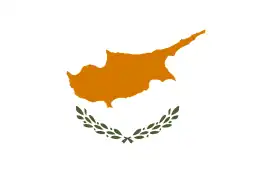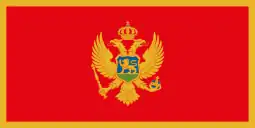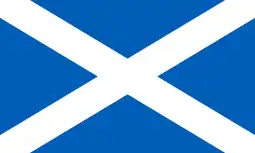2018–19 UEFA Nations League C
The 2018–19 UEFA Nations League C was the third division of the 2018–19 edition of the UEFA Nations League, the inaugural season of the international football competition involving the men's national teams of the 55 member associations of UEFA.[1]
| Tournament details | |
|---|---|
| Dates | 6 September – 20 November 2018 |
| Teams | 15 |
| Promoted | |
| Tournament statistics | |
| Matches played | 42 |
| Goals scored | 92 (2.19 per match) |
| Attendance | 338,393 (8,057 per match) |
| Top scorer(s) | |
Format
League C consisted of 15 UEFA members ranked from 25 to 39, which were split into four groups (one group of three and three groups of four). The top two teams of each group were promoted to the 2020–21 UEFA Nations League B, and the bottom four ranked teams were initially relegated to the 2020–21 UEFA Nations League D (the bottom teams of Group 2, 3, and 4, along with the lowest ranked third-placed team of League C).[2] However, following UEFA announcement of format changes for the next edition's groups in September 2019, none of the 2018–19 League C teams were relegated to League D.[3]
In addition, League C was allocated one of the four remaining UEFA Euro 2020 places.[4][5] The play-off berths were first allocated to each Nations League group winner, and if any of the group winners had already qualified for the European Championship finals, then to the next best ranked team of the league, etc. As Finland already qualified for the European Championship finals through regular qualifiers, the seven best ranked teams from League C competed in the play-offs, played in October and November 2020.
Seeding
Teams were allocated to League C according to their UEFA national team coefficients after the conclusion of the 2018 FIFA World Cup qualifying group stage on 11 October 2017. Teams were split into four pots (three pots of four teams and one pot of the three lowest teams), ordered based on their UEFA national team coefficient.[6][7] The group with three teams contained teams only from pots 1, 2, and 3. The seeding pots for the draw were announced on 7 December 2017.[8]
|
|
|
|
The group draw took place at the SwissTech Convention Center in Lausanne, Switzerland on 24 January 2018, 12:00 CET.[9][10][11][12] Due to winter venue restrictions, a group could only contain a maximum of two of the following teams: Norway, Finland, Estonia, Lithuania.[13]
Groups
The fixture list was confirmed by UEFA on 24 January 2018 following the draw.[14][15]
Times are CET/CEST,[note 1] as listed by UEFA (local times, if different, are in parentheses).
Group 1
| Pos | Team | Pld | W | D | L | GF | GA | GD | Pts | Promotion[lower-alpha 1] | ||||
|---|---|---|---|---|---|---|---|---|---|---|---|---|---|---|
| 1 | 4 | 3 | 0 | 1 | 10 | 4 | +6 | 9 | Promotion to League B | — | 3–2 | 2–0 | ||
| 2 | 4 | 2 | 0 | 2 | 6 | 5 | +1 | 6 | 2–1 | — | 2–0 | |||
| 3 | 4 | 1 | 0 | 3 | 1 | 8 | −7 | 3 | 0–4 | 1–0 | — |
- Due to revamp of the format for the 2020–21 UEFA Nations League, no teams were eventually relegated, and the second-placed teams in each group were also promoted.
Group 2
| Pos | Team | Pld | W | D | L | GF | GA | GD | Pts | Promotion[lower-alpha 1] | |||||
|---|---|---|---|---|---|---|---|---|---|---|---|---|---|---|---|
| 1 | 6 | 4 | 0 | 2 | 5 | 3 | +2 | 12 | Promotion to League B | — | 1–0 | 2–0 | 1–0 | ||
| 2 | 6 | 3 | 1 | 2 | 9 | 6 | +3 | 10 | 2–0 | — | 2–1 | 2–0 | |||
| 3 | 6 | 3 | 0 | 3 | 4 | 5 | −1 | 9 | 1–0 | 1–0 | — | 0–1 | |||
| 4 | 6 | 1 | 1 | 4 | 4 | 8 | −4 | 4 | 0–1 | 3–3 | 0–1 | — |
- Due to revamp of the format for the 2020–21 UEFA Nations League, no teams were eventually relegated, and the second-placed teams in each group were also promoted.
| Greece | 0–1 | |
|---|---|---|
| Report |
|
Group 3
| Pos | Team | Pld | W | D | L | GF | GA | GD | Pts | Promotion[lower-alpha 1] | |||||
|---|---|---|---|---|---|---|---|---|---|---|---|---|---|---|---|
| 1 | 6 | 4 | 1 | 1 | 7 | 2 | +5 | 13 | Promotion to League B | — | 1–0 | 2–0 | 1–0 | ||
| 2 | 6 | 3 | 2 | 1 | 7 | 5 | +2 | 11 | 1–0 | — | 2–1 | 1–1 | |||
| 3 | 6 | 1 | 2 | 3 | 5 | 9 | −4 | 5 | 0–2 | 1–1 | — | 2–1 | |||
| 4 | 6 | 0 | 3 | 3 | 5 | 8 | −3 | 3 | 1–1 | 1–2 | 1–1 | — |
- Due to revamp of the format for the 2020–21 UEFA Nations League, no teams were eventually relegated, and the second-placed teams in each group were also promoted.
| Norway | 1–0 | |
|---|---|---|
|
Report |
Group 4
| Pos | Team | Pld | W | D | L | GF | GA | GD | Pts | Promotion[lower-alpha 1] | |||||
|---|---|---|---|---|---|---|---|---|---|---|---|---|---|---|---|
| 1 | 6 | 4 | 2 | 0 | 11 | 4 | +7 | 14 | Promotion to League B | — | 2–2 | 2–1 | 4–1 | ||
| 2 | 6 | 3 | 3 | 0 | 8 | 3 | +5 | 12 | 0–0 | — | 0–0 | 3–0 | |||
| 3 | 6 | 2 | 1 | 3 | 7 | 6 | +1 | 7 | 0–2 | 0–1 | — | 2–0 | |||
| 4 | 6 | 0 | 0 | 6 | 3 | 16 | −13 | 0 | 0–1 | 1–2 | 1–4 | — |
- Due to revamp of the format for the 2020–21 UEFA Nations League, no teams were eventually relegated, and the second-placed teams in each group were also promoted.
| Romania | 0–0 | |
|---|---|---|
| Report |
| Montenegro | 0–2 | |
|---|---|---|
| Report |
| Lithuania | 1–4 | |
|---|---|---|
|
Report |
| Serbia | 2–1 | |
|---|---|---|
| Report |
|
| Serbia | 4–1 | |
|---|---|---|
| Report |
|
| Montenegro | 0–1 | |
|---|---|---|
| Report |
|
Goalscorers
There were 92 goals scored in 42 matches, for an average of 2.19 goals per match.
6 goals
5 goals
4 goals
3 goals
2 goals
1 goal
 Taulant Xhaka
Taulant Xhaka Kiril Despodov
Kiril Despodov Nikolay Dimitrov
Nikolay Dimitrov Galin Ivanov
Galin Ivanov Todor Nedelev
Todor Nedelev Radoslav Vasilev
Radoslav Vasilev Grigoris Kastanos
Grigoris Kastanos Fotios Papoulis
Fotios Papoulis Pieros Sotiriou
Pieros Sotiriou Panagiotis Zachariou
Panagiotis Zachariou Henri Anier
Henri Anier Siim Luts
Siim Luts Glen Kamara
Glen Kamara Pyry Soiri
Pyry Soiri Kostas Fortounis
Kostas Fortounis Kostas Manolas
Kostas Manolas Kostas Mitroglou
Kostas Mitroglou László Kleinheisler
László Kleinheisler Ádám Nagy
Ádám Nagy Dominik Nagy
Dominik Nagy Willi Orbán
Willi Orbán Roland Sallai
Roland Sallai Tomer Hemed
Tomer Hemed Beram Kayal
Beram Kayal Dor Peretz
Dor Peretz Dia Saba
Dia Saba Eran Zahavi
Eran Zahavi Rolandas Baravykas
Rolandas Baravykas Deimantas Petravičius
Deimantas Petravičius Artūras Žulpa
Artūras Žulpa Marko Janković
Marko Janković Boris Kopitović
Boris Kopitović Stefan Savić
Stefan Savić Darko Zorić
Darko Zorić Mohamed Elyounoussi
Mohamed Elyounoussi Bjørn Maars Johnsen
Bjørn Maars Johnsen Ole Selnæs
Ole Selnæs Alexandru Chipciu
Alexandru Chipciu Claudiu Keșerü
Claudiu Keșerü Alexandru Maxim
Alexandru Maxim George Pușcaș
George Pușcaș Steven Fletcher
Steven Fletcher Ryan Fraser
Ryan Fraser Charlie Mulgrew
Charlie Mulgrew Steven Naismith
Steven Naismith Aleksandar Prijović
Aleksandar Prijović Dušan Tadić
Dušan Tadić Robert Berić
Robert Berić Nejc Skubic
Nejc Skubic Benjamin Verbič
Benjamin Verbič
1 own goal
 Berat Djimsiti (against Scotland)
Berat Djimsiti (against Scotland) Albin Granlund (against Greece)
Albin Granlund (against Greece) Vassilis Lambropoulos (against Estonia)
Vassilis Lambropoulos (against Estonia) Máté Pátkai (against Estonia)
Máté Pátkai (against Estonia) Artūras Žulpa (against Serbia)
Artūras Žulpa (against Serbia) Kieran Tierney (against Israel)
Kieran Tierney (against Israel) Petar Stojanović (against Cyprus)
Petar Stojanović (against Cyprus)
Overall ranking
The 15 League C teams were ranked 25th to 39th overall in the 2018–19 UEFA Nations League according to the following rules:[2][23]
- The teams finishing first in the groups will be ranked 25th to 28th according to the results of the league phase, not taking into account results against the fourth-placed teams.
- The teams finishing second in the groups will be ranked 29th to 32nd according to the results of the league phase, not taking into account results against the fourth-placed teams.
- The teams finishing third in the groups will be ranked 33rd to 36th according to the results of the league phase, not taking into account results against the fourth-placed teams.
- The teams finishing fourth in the groups will be ranked 37th to 39th according to the results of the league phase, taking into account all results.
| Rnk | Grp | Team | Pld | W | D | L | GF | GA | GD | Pts |
|---|---|---|---|---|---|---|---|---|---|---|
| 25 | C1 | 4 | 3 | 0 | 1 | 10 | 4 | +6 | 9 | |
| 26 | C3 | 4 | 3 | 0 | 1 | 5 | 1 | +4 | 9 | |
| 27 | C4 | 4 | 2 | 2 | 0 | 6 | 3 | +3 | 8 | |
| 28 | C2 | 4 | 2 | 0 | 2 | 3 | 3 | 0 | 6 | |
| 29 | C3 | 4 | 2 | 1 | 1 | 4 | 3 | +1 | 7 | |
| 30 | C1 | 4 | 2 | 0 | 2 | 6 | 5 | +1 | 6 | |
| 31 | C2 | 4 | 2 | 0 | 2 | 4 | 3 | +1 | 6 | |
| 32 | C4 | 4 | 1 | 3 | 0 | 3 | 2 | +1 | 6 | |
| 33 | C2 | 4 | 2 | 0 | 2 | 3 | 4 | −1 | 6 | |
| 34 | C1 | 4 | 1 | 0 | 3 | 1 | 8 | −7 | 3 | |
| 35 | C4 | 4 | 0 | 1 | 3 | 1 | 5 | −4 | 1 | |
| 36 | C3 | 4 | 0 | 1 | 3 | 2 | 7 | −5 | 1 | |
| 37 | C2 | 6 | 1 | 1 | 4 | 4 | 8 | −4 | 4 | |
| 38 | C3 | 6 | 0 | 3 | 3 | 5 | 8 | −3 | 3 | |
| 39 | C4 | 6 | 0 | 0 | 6 | 3 | 16 | −13 | 0 |
Prize money
The prize money to be distributed was announced in March 2018.[24] Each team in League C received a solidarity fee of €750,000. In addition, the four group winners received double this amount with a €750,000 bonus fee. This meant that the maximum amount of solidarity and bonus fees for a team from League C was €1.5 million.
Euro 2020 qualifying play-offs
The seven best teams in League C according to the overall ranking that did not qualify for UEFA Euro 2020 through the qualifying group stage competed in the play-offs, with the winners qualifying for the final tournament.
| Rank | Team |
|---|---|
| 25 GW | |
| 26 GW | |
| 27 GW | |
| 28 GW | |
| 29 | |
| 30 | |
| 31 | |
| 32 | |
| 33 | |
| 34 | |
| 35 | |
| 36 | |
| 37 | |
| 38 | |
| 39 |
Key
- GW Nations League group winner
- H UEFA Euro 2020 host at the time of the draw
- Team advanced to play-offs
- Team qualified directly to final tournament
Notes
- CEST (UTC+2) for matchdays 1–4 (September and October 2018), CET (UTC+1) for matchdays 5–6 (November 2018).
- The Hungary v Greece match was played behind closed doors due to a UEFA punishment against Hungary for racist behaviour in their UEFA Euro 2016 qualifying home match against Romania.[18]
- The Romania v Montenegro match was played behind closed doors due to a UEFA punishment against Romania for racist behaviour in their UEFA Euro 2016 qualifying home match against Greece.[21]
- The Romania v Lithuania match was played behind closed doors due to a UEFA punishment against Romania for racist behaviour in their 2018–19 UEFA Nations League home match against Serbia.[22]
References
- "UEFA Nations League receives associations' green light". UEFA. 27 March 2014.
- "Regulations of the UEFA Nations League 2018/19" (PDF). UEFA.com. Union of European Football Associations. 28 September 2017. Retrieved 3 October 2017.
- "Format change for 2020/21 UEFA Nations League". UEFA.com. Union of European Football Associations. 24 September 2019. Retrieved 24 September 2019.
- "UEFA Nations League format and schedule approved". UEFA.com. 4 December 2014.
- "UEFA Nations League format and schedule confirmed". UEFA. 4 December 2014.
- "Confirmed: How the UEFA Nations League will line up". UEFA.com. Union of European Football Associations. 11 October 2017. Retrieved 11 October 2017.
- "National Team Coefficients Overview" (PDF). UEFA.com. Union of European Football Associations. 11 October 2017. Retrieved 11 October 2017.
- "UEFA Nations League draw seedings confirmed". UEFA.com. Union of European Football Associations. 7 December 2017. Archived from the original on 9 February 2018. Retrieved 7 December 2017.
- "UEFA Nations League format confirmed". UEFA.com. Union of European Football Associations. 20 September 2017. Retrieved 20 September 2017.
- "All you need to know: UEFA Nations League draw". UEFA.com. Union of European Football Associations. 17 January 2018. Retrieved 23 January 2018.
- "League Phase Draw Press Kit" (PDF). UEFA.com. Union of European Football Associations. 22 January 2018. Retrieved 23 January 2018.
- "UEFA Nations League 2018/19 League Phase draw". UEFA.com. Union of European Football Associations. 24 January 2018. Retrieved 24 January 2018.
- "UEFA Nations League 2018/19 – League Phase Draw Procedure" (PDF). UEFA.com. Union of European Football Associations. 7 December 2017. Retrieved 8 December 2017.
- "UEFA Nations League calendar: all the fixtures". UEFA.com. Union of European Football Associations. 24 January 2018. Retrieved 24 January 2018.
- "UEFA Nations League 2018/19: Fixtures List – League Phase" (PDF). UEFA.com. Union of European Football Associations. 24 January 2018. Retrieved 24 January 2018.
- "Summary UEFA Nations League C – Group 1". Soccerway. Retrieved 30 November 2018.
- "Summary UEFA Nations League C – Group 2". Soccerway. Retrieved 30 November 2018.
- "Zárt kapus lesz a magyar csapat első hazai meccse" [Closed gate the first home match of the Hungarian team]. Origo.hu (in Hungarian). New Wave Media Group. 24 January 2018. Retrieved 2 February 2018.
- "Summary UEFA Nations League C – Group 3". Soccerway. Retrieved 30 November 2018.
- "Summary UEFA Nations League C – Group 4". Soccerway. Retrieved 30 November 2018.
- "A fost stabilit țintarul din Liga Națiunilor: România debutează acasă, fără spectatori!" [The draw of the Nations League is set: Romania starts at home without spectators!]. gsp.ro (in Romanian). Gazeta Sporturilor. 24 January 2018. Retrieved 2 February 2018.
- Sports Staff (26 October 2018). "Romania fined and ordered to play next Nations League game behind closed doors by Uefa due to 'racist behaviour' of fans". The Independent. Archived from the original on 1 May 2022. Retrieved 12 September 2019.
- "2018/19 UEFA Nations League rankings" (PDF). UEFA.com. Union of European Football Associations. 20 November 2018. Retrieved 21 November 2018.
- "UEFA Nations League solidarity and bonus fees". UEFA.com. Union of European Football Associations. 23 March 2018. Retrieved 4 April 2018.